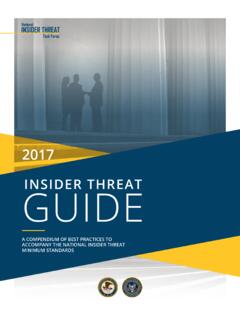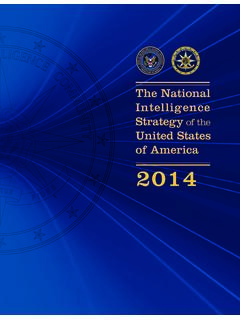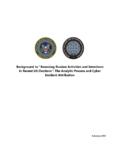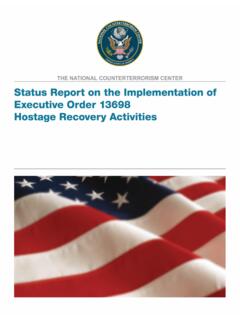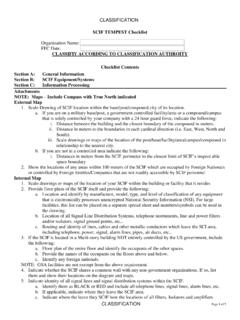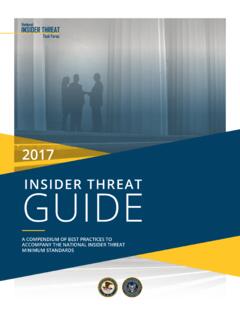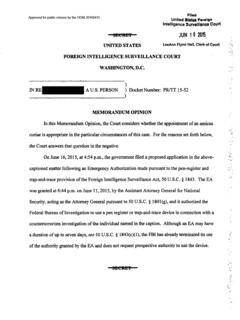Transcription of INTELLIGENCE COMMUNITY POLICY GUIDANCE
1 INTELLIGENCE COMMUNITY POLICY GUIDANCENUMBER SECURITY ADJUDICATIVE GUIDELINES FOR DETERMININGELIGIBILITY FOR ACCESS TO SENSITIVE COMPARTMENTED INFORMATIONAND OTHER CONTROLLED ACCESS PROGRAM INFORMATION(EFFECTIVE: 02 OCTOBER 2008)ICPG AUTHORITY:The National Security Act of 1947, as amended; the CounterintelligenceEnhancement Act of 2002, as amended; Executive Order (EO) 12333, as amended; EO 13355;EO 12968, and other applicable provisions of APPLICABILITY:This directive applies to the INTELLIGENCE COMMUNITY (IC),as defined bythe National Security Act of 1947, as amended; and other departments or agencies that may bedesignated by the President, or designated jointly by the Director of National INTELLIGENCE (DNI)and the Head of the Department or Agency concerned, as an Element of the IC or thosegovernment entities designated to determine eligibility for access to Sensitive CompartmentedInformation (SCI) and other controlled access program ADJUDICATIVE PARAMETERS1.
2 Annex A to this document is the Adjudicative Guidelines for Determining Eligibility forAccess to Classified Information, as promulgated under an Office of Management and Budgetmemorandum dated 29 December 2005, from the Assistant for National Security Eligibility for access to SCI and other controlled access program information shall bedetermined through the evaluation of all information bearing on a subject's loyalty, reliability,and trustworthiness developed through a background investigation conducted by authorizedinvestigative personnel. Authorized adjudicative personnel shall conduct such evaluations underthe cognizance of the Head of the IC Element Subjects who have had access to SCI and other controlled access program informationwithin the last two (2) years and who possess a security determination that is otherwise current,shall have their accesses reinstated at the granting agency or, pursuant to reciprocity, elsewherein the IC.
3 An updated personal history questionnaire may be reviewed only if a break in accessof greater than 60 days has occurred or if a polygraph interview is necessary. A reinvestigationICPG not be required unless the review indicates the person no longer satisfies the criteria setforth in INTELLIGENCE COMMUNITY POLICY GUIDANCE (ICPG) , Personnel Security InvestigativeStandards and Procedures Governing Eligibility for Access to Sensitive CompartmentedInformation and other Controlled Access Program Information, and EO Adjudications conducted within five (5) years of the date of the last investigation thatmeet the investigative protocols set forth in EO 12968 and are further documented in ICPG serve as the basis for granting continued access except where new information indicates thesubject may not satisfy the adjudicative requirements contained therein or the originaladjudication was recorded with an exception.
4 If previous investigations do not meet thestandards set forth in ICPG , a reinvestigation shall be conducted. The scope of thereinvestigation shall be limited to only that coverage necessary to update the subject'sbackground investigation and make it consistent with current adjudicative standards. Updatedadjudications will require a review of all applicable records and submittal of a Standard Form 86,Questionnaire for National Security Positions. A reinvestigation shall be required when it isdetermined that the individual no longer satisfies standards for access under this unfavorable information be developed, inquiries shall be expanded to the extentnecessary to render a new access IC organizations that grant personnel security clearances shall establish proceduresconsistent with their operating environments and mission requirements that further theadjudication of "issue-free" (no adverse information) personnel security cases within 10 days ofreceipt of such a case by the adjudicative The depaitinent or agency with adjudicative authority remains responsible for the EFFECTIVE DATE.
5 This ICPG is effective on the date of signature. z~-~e)Aw-g, aae8 Deputy Director of National INTELLIGENCE for DatePolicy, Plans and Requirements2 APPENDIX A - ACRONYMSICPG PERSONNEL SECURITY ADJUDICATIVE GUIDELINES FOR DETERMININGELIGIBILITY FOR ACCESSTOSENSITIVE COMPARTMENTED INFORMATION AND OTHERCONTROLLED ACCESS PROGRAM INFORMATION3 ICPG of National IntelligenceEOExecutive OrderICIntelligence CommunityICPGI ntelligence COMMUNITY POLICY GuidanceSCIS ensitive Compartmented InformationANNEX AADJUDICATIVE GUIDELINESF ollowing are the Adjudicative Guidelines for Determining Eligibility for Access toSensitive Compartmented IntroductionA. The following adjudicative guidelines are established for all United States Governmentcivilian and military personnel, consultants, contractors, employees of contractors, licensees,certificate holders or grantees and their employees, and other individuals who require access toclassified information.
6 They apply to persons being considered for initial or continued eligibilityfor access to classified information, to include sensitive compartmented information and specialaccess programs, and are to be used by government departments and agencies for all finalclearance determinations. Government departments and agencies may also choose to apply theseguidelines to analogous situations regarding persons being considered for access to other types ofprotected Decisions regarding eligibility for access to classified information take into accountfactors that could cause a conflict of interest and place a person in the position of having tochoose between his or her commitments to the United States, including the commitment toprotect classified information, and any other compelling loyalty.
7 Access decisions also take intoaccount a person's reliability, trustworthiness and ability to protect classified information. Nocoercive policing could replace the self-discipline and integrity of the person entrusted with thenation's secrets as the most effective means of protecting them. When a person's life historyshows evidence of unreliability or untrustworthiness, questions arise whether the person can berelied on and trusted to exercise the responsibility necessary for working in a secret environmentwhere protecting classified information is The Adjudicative ProcessA. The adjudicative process is an examination of a sufficient period of a person's life tomake an affirmative determination that the person is an acceptable security risk.
8 Eligibility foraccess to classified information is predicated upon the individual meeting these personnelsecurity guidelines. The adjudication process is the careful weighing of a number of variablesknown as the whole-person concept. Available, reliable information about the person, past andpresent, favorable and unfavorable, should be considered in reaching a determination. Inevaluating the relevance of an individual's conduct, the adjudicator should consider the followingfactors:1. The nature, extent, and seriousness of the conduct;2. The circumstances surrounding the conduct, to include knowledgeable participation;3. The frequency and recency of the conduct;4. The individual's age and maturity at the time of the conduct;5.
9 The extent to which participation is voluntary;6. The presence or absence of rehabilitation and other permanent behavioral changes;ICPG The motivation for the conduct;8. The potential for pressure, coercion, exploitation, or duress; and9. The likelihood of continuation or Each case must be judged on its own merits, and final determination remains theresponsibility of the specific department or agency. Any doubt concerning personnel beingconsidered for access to classified information will be resolved in favor of the national The ability to develop specific thresholds for action under these guidelines is limited bythe nature and complexity of human behavior. The ultimate determination of whether thegranting or continuing of eligibility for a security clearance is clearly consistent with the interestsof national security must be an overall common sense judgment based upon careful considerationof the following guidelines, each of which is to be evaluated in the context of the whole person:1.
10 Allegiance to the United States;2. Foreign Influence;3. Foreign Preference;4. Sexual Behavior;5. Personal Conduct;6. Financial Considerations;7. Alcohol Consumption;8. Drug Involvement;9. Psychological Conditions;10. Criminal Conduct;11. Handling Protected Information;12. Outside Activities; and13. Use of Information Technology Although adverse information concerning a single criterion may not be sufficient for anunfavorable determination, the individual may be disqualified if available information reflects arecent or recurring pattern of questionable judgment, irresponsibility, or emotionally unstablebehavior. Notwithstanding the whole-person concept, pursuit of further investigation may beterminated by an appropriate adjudicative agency in the face of reliable, significant,disqualifying, adverse When information of security concern becomes known about an individual who iscurrently eligible for access to classified information, the adjudicator should consider whetherthe person:1.

